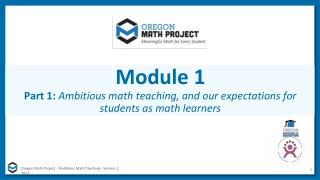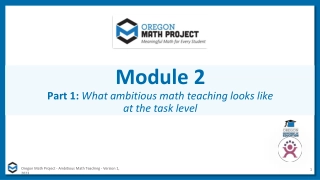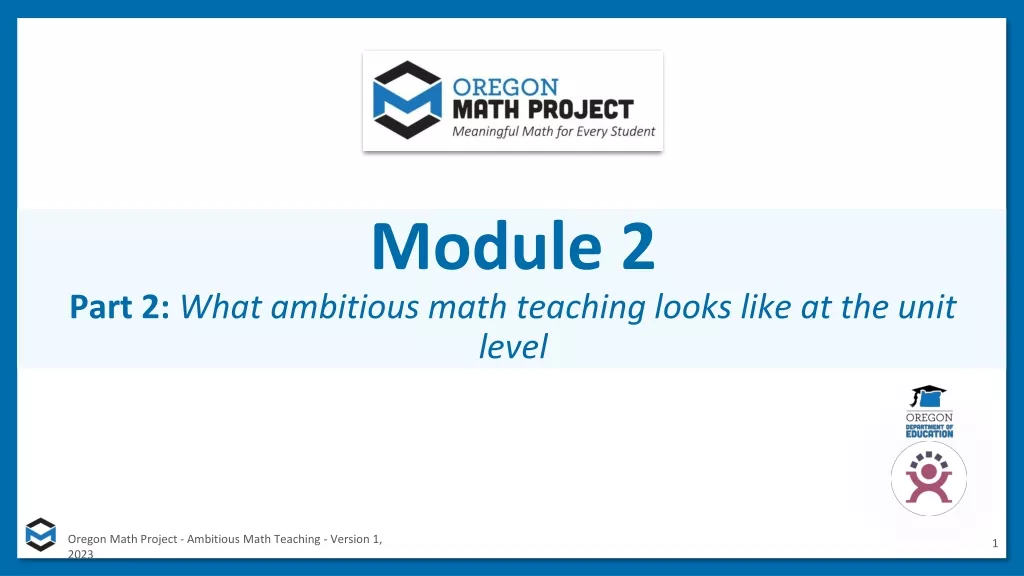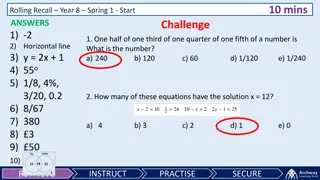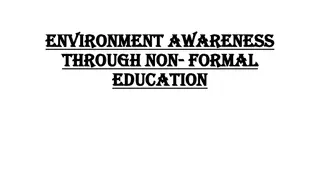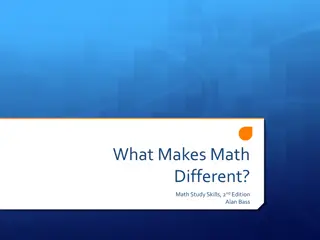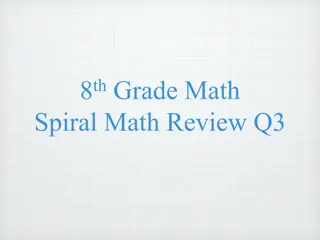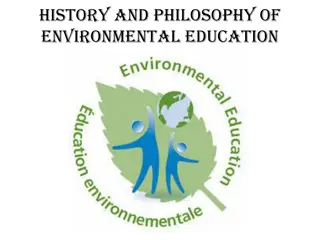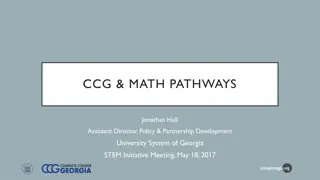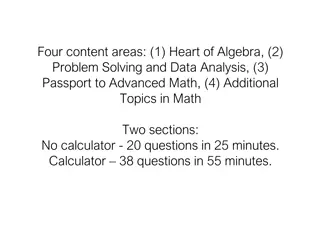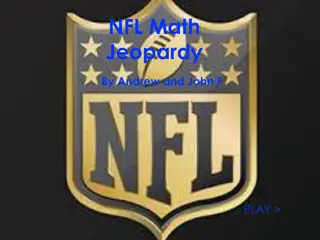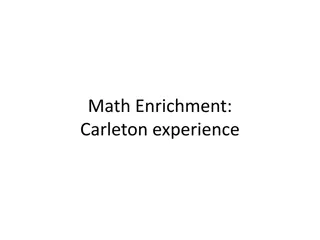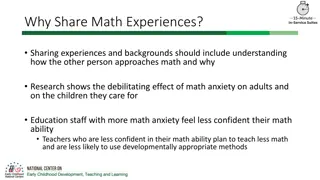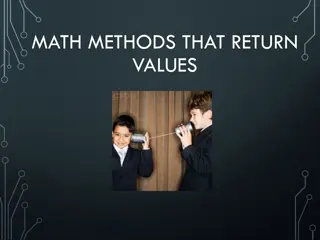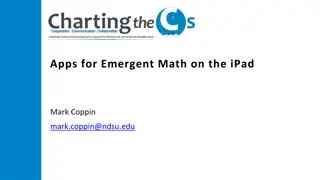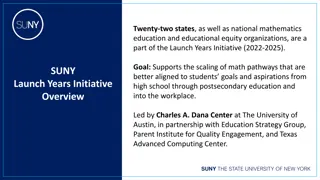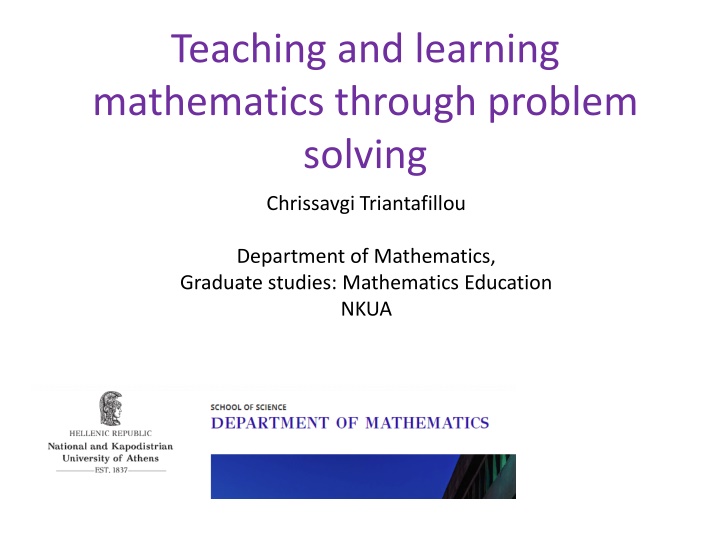
Teaching and Learning Mathematics Through Problem Solving in Mathematics Education
Explore the connection between mathematics education and environmental issues through problem-solving approaches. Discover the role of mathematics in addressing global environmental crises, challenges faced by educators, and the ethical considerations in teaching mathematics in context of environmental issues.
Download Presentation

Please find below an Image/Link to download the presentation.
The content on the website is provided AS IS for your information and personal use only. It may not be sold, licensed, or shared on other websites without obtaining consent from the author. If you encounter any issues during the download, it is possible that the publisher has removed the file from their server.
You are allowed to download the files provided on this website for personal or commercial use, subject to the condition that they are used lawfully. All files are the property of their respective owners.
The content on the website is provided AS IS for your information and personal use only. It may not be sold, licensed, or shared on other websites without obtaining consent from the author.
E N D
Presentation Transcript
Teaching and learning mathematics through problem solving Chrissavgi Triantafillou Department of Mathematics, Graduate studies: Mathematics Education NKUA
Environmental issues in Mathematics education Examples of environmental issues How they could be connected with mathematics teaching?
Global Environmental/ ecological crisis | 3
What is the role of mathematics education in the global environmental crisis? Boylan & Coles (2017) address this question to mathematics education research and school community: What is the role of mathematics education in the global environmental crisis? In recent years in mathematics education, many researchers admit that environmental/ecological crisis challenges mathematics education ethics and values. Q) What do researchers mean by environmental/ecological crisis challenges mathematics education ethics and values. ? Can you provide specific examples of such challenges ? | 4
Mathematics education values and ethics vs ethics about environmental issues Mathematics is a context-free subject of knowledge. a universal subject has a unitary ethics for every one that fits all situations and all circumstances Are politically neutral Environmental issues are not predictable Their ethics is not universal Have political dimensions
Challenges for Mathematics education Lack of Lack of Te Teachers lack generally specific knowledge about science content relevant to environmental issues, or appropriate skills to address scientific as well as non- scientific dimensions related to these issues (e.g., cultural, political, economic, ) Teaching challenges Teaching challenges They often express difficulties in teaching issues with no one right solution or for which they don t have all the information, may find it difficult to identify the mathematics side of these issues. Systemic challenges Systemic challenges Lack of tasks related to environmental issues In the case that these tasks exist, usually emphasis is given to concept understanding, Tea achers chers Content knowledge Content knowledge rather than consideration of their social and ethical dimensions , discussing dilemmas, organizing debates and supporting students' argumentation activities.
Environmental issue: Global Warming A temperature anomaly is the difference from an average, or baseline, temperature. The baseline temperature is typically computed by averaging 30 or more years of temperature data. Look at the graph. Q1) How could you argue that global warming exists? Q2) Did you use any mathematics to respond to the above question? If yes, please explain. Source: http://www.cru.uea.ac.uk/ | 7
Relating problem solving with environmental issues According to Vos (2018) the environmental issues possess the two essential authentic task characteristics: a) the out-of-school origin and b) the certification of originality, thus they could engage students in authentic, meaningful and context-driven mathematics thinking processes that address issues of societal concerns (Yaro et al, 2020). The modelling circle (students processes while translating between the real world and mathematics in both directions) | 8
Q: Where do you place the global warming task in relation to the modelling circle? | 9
Group task (20 mins) Two classroom tasks are provided in the next slides. These tasks are related to two well known environmental issues. Read the classroom tasks and try to respond in the following questions: Q1: Compare these tasks with standard/typical school tasks Q2: Which one you could use in your classroom? Possible choices: None, Both, One (specify). Reason on your choice (including/excluding a task) | 10
Environmental issue 1: Should wind power plants be set up everywhere? Classroom TASK 1 Q1) From windmills to wind power plants: Identify differences between windmills and generators/turbines. Q2)Design various types of windmill blades as well the blade of one power turbine. Q3) Provide scientific arguments favoring or opposing the use of wind power plants. wind power based What other aspects influence the decision on setting up wind power plants? | 11
Environmental issue 2: Global warming Classroom TASK 2 Look at the graph. Q1. How could you argue that there is a global warming issue? Q2. Strengthen your argument by presenting similar representations from various resources (e.g., school texts, internet, scientific articles). Source: http://www.cru.uea.ac.uk/ | 12
Group task (10 mins) | 13
Environmental issues (hidden) in the school mathematics texts Q1) What is the environmental issue that is directly or indirectly related with this task? Q2) How could you change this textbook task in order to make transparent its dimensions? Q3) Where to you place the textbook task and your new developed task in relation to the modelling circle? environmental | 14
Idea for poster presentation Look in school (mathematics and/or other subjects) textbooks for problems related to environmental issues. 1) Choose and present one textbook task as it appears in the textbook, by citing your source (e.g., Mathematics, Grade 1, Unit: Fractions) 2) What is the environmental issue that is directly or indirectly related with this task? 3) How could you change this textbook task in order to make transparent its environmental dimensions? | 15
Selected references Boylan, M., & Coles, A. T., 2017, Is another mathematics education possible? an introduction to a Special Issue on Mathematics Education and the Living world, Philosophy of Mathematics Education Journal. Evagorou, M., 2011, Discussing a socioscientific issue in a primary school classroom: The case of using a technology- supported environment in formal and nonformal settings. In T. Sadler (Ed.), Socio-scientific issues in the classroom, 133-160. Hauge, K. H., & Barwell, R. (2022). Education for post-normal times. In R. Herheim, T. Werler, & K. H. Hauge (Eds.), Lived democracy in education: Young citizens democratic lives in kindergarten, school and higher education (pp. 65 76). Routledge. Maass, K., Doorman, M., Jonker, V., &Wijers, M., 2019, Promoting active citizenship in mathematics teaching. , ZDM, 51(6), 991-1003. https://doi.org/10.1007/s11858-019-01048-6 Owens, D. C., Herman, B. C., Oertli, R. T., Lannin, A. A., & Sadler, T. D. (2019). Secondary science and mathematics teachers environmental issues engagement through socio-scientific reasoning. Eurasia Journal of Mathematics, Science and Technology Education: Special Issue on Enhancing Environmental Literacy in K-12 Science Classrooms, 15(6) https://doi.org/10.29333/ejmste/103561 Vos, P. (2018). How real people really need mathematics in the real world Authenticity in mathematics education. Education Sciences, 8(4), 195. https://doi.org/10.3390/educsci8040195 Yaro, K., Amoah, E., & Wagner, D. (2020). Situated perspectives on creating mathematics tasks for peace and sustainability. Canadian Journal of Science, Mathematics and Technology Education, https://doi.org/10.1007/s42330-020-00083-w 20, 218-229. | 16

